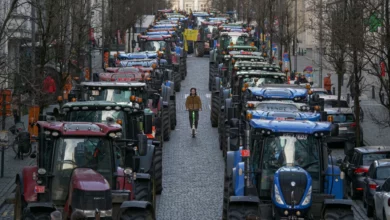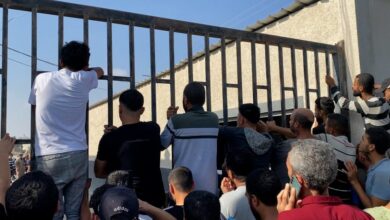In 1964, during the height of “Arab Socialist” President Gamal Abdel Nasser’s popularity, a new constitution was drafted that included a 50 percent quota for “workers and farmers” serving in the parliament. Forty-seven years and three rounds of constitutional amendments later, the quota remains in place as Egypt prepares for the first open parliamentary elections in recent history.
Nasser said that the law was intended to empower the working class in a country where 70 percent of the population was made up of workers and farmers. However, the definition of a “worker” or “farmer” under this law is a point of contention, and many advocates of the working class have doubts that this quota makes a difference in the communities it is meant to empower.
“The authorities should have canceled the 50 percent workers' and farmers' quota rather than women's quota,” says Walaa Ezzat, a farmer candidate from the Tagammu Party in the Nile Delta city of Mansoura, referring to a short-lived quota intended to boost the number of female members of parliament. "Reserving 50 percent of seats for workers and farmers only serves to protect the interests of those who are backed by the ruling forces."
Shahinda Miqlad, a left-wing activist focusing on farmers’ rights, expresses similar skepticism about the outcome of the upcoming parliamentary elections. “Large landowners running as farmer representatives will sweep these elections because they have resources and campaign money to do so successfully," she says.
According to Miqlad, landless peasants have nominated themselves for the current elections, as they have done for decades, but have little to no chance of winning. "These elections will not bring into power those workers, farmers and youth activists who took part in the revolution."
Kamal Abbas, a labor activist and the director of the Center for Trade Union and Workers’ Rights, agrees. “This constitutional article doesn't guarantee the actual representation of workers and farmers. In this parliament, as in all previous ones, the authorities and ruling forces will fill these seats with their own representatives. “
Worker candidates
The law defines a worker simply as someone who is a dues-paying member of a labor union and receives his or her income solely from “manual or intellectual labor.” Determining who falls into this category has become another battleground for the control of organized labor in Egypt.
Before the 25 January revolution, the only entity authorized to grant the classification of worker candidate was the state-controlled Egyptian Trade Union Federation (ETUF). But in October, interim Manpower and Immigration Minister Ahmed Hassan al-Borai authorized the Federation of Egyptian Trade Unions (FETU), which was officially established on 30 January, to grant its dues-paying members the worker classification.
Mohamed Zakariya, the president of the Independent Teachers Syndicate in Port Said, told Al-Masry Al-Youm that he received the classification of worker candidate from the FETU, not the ETUF.
"I expect more genuine workers' representation in this future parliament," says Zakariya, a first-time candidate who supports the quota system. "I expect that worker representatives will fight for labor rights in parliament, along with activists in the field of independent trade unionism."
However, Zakariya acknowledges that dozens of independent trade unionists have been prevented from running as worker candidates in the upcoming elections.
The classification problems are caused by Trade Union Law 35/1976, which is in the process of being redrafted. The law only recognizes the authority of the ETUF, and accordingly, it is the only entity authorized to grant the worker classification to parliamentary candidates. Because no new trade union law has yet been issued, Law 35 remains in effect, despite the decree issued by Borai allowing the FETU to also grant this classification to applicable candidates.
Dozens of independent unionists from Giza and the Nile Delta governorates of Daqahlia, Monufiya and Qalyubiya have not been recognized by the Supreme Judicial Committee for Elections (SJCE) as worker candidates on the basis that they received this classification from the FETU, not the ETUF. A number of these independent unionists have filed urgent appeals before the administrative courts. However, verdicts due to be issued have been repeatedly postponed.
"The failure of the SJCE to recognize our candidacies is a blatant electoral violation," says Fatma Ramadan, an independent unionist and employee at the Manpower Department in Giza. Ramadan adds that in light of the decree issued by Borai, "This refusal represents an unwarranted act of intervention by the election authorities.”
“Withholding recognition also represents an act of vote-rigging because it keeps independent unionists from being able to run in the elections and gives the state-controlled ETUF a monopoly on the issuing of the worker classifications," she adds.
The Qalyubiya Administrative Court issued a verdict on 16 November allowing worker candidates to receive the classification from their independent unions, not only the ETUF. However, in other governorates, such as Giza, where Ramadan is running, the matter has not been resolved, and candidates have been asked to resubmit their papers for consideration.
This is only a start to fixing problems with the quota system. In previous parliaments all a candidate needed to run as a worker or farmer was connections to the ruling party or the leadership of the ETUF. “The quota is meant to protect the interests of the most thoroughly exploited and underprivileged sectors of society," says Zakariya. “We should work on guaranteeing that this classification is granted only to genuine unionists, workers and farmers — not retired officers, corporate managers and businessmen,” she adds.
Farmer candidates
The discussion surrounding farmer candidates is similar, but the category is more easily exploited. According to the Parliamentary Elections Law, anyone whose source of income comes from farming, resides in the countryside and owns no more than 10 feddans of land can run as a farmer. Local agricultural cooperatives, under the administration of the Agriculture Ministry, are the only entities authorized to grant candidates the classification.
But like the businesspeople who have run as workers, “the majority of people who have been classified as farmer candidates are exploiting this classification for their own ends,” says Ezzat. “Most of the so-called farmers who served as MPs in previous parliaments were in fact retired officers, businessmen, large landowners and even feudalists.”
"It is difficult to forecast the results of this election, and how representative the new parliament’s farmer MPs will be. However, one may easily predict that those candidates who have money will be the most likely to end up with seats," she says.
Mosaad Lotfy, a farmer MP from Mansoura who served several terms in parliament, could not be reached for comment. Lotfy was a member of Mubarak's ruling National Democratic Party (NDP). He is running again as a farmer.
The coming parliament “will be very much like those that preceded it, with no real farmers' representation,” says Miqlad, the farmers’ rights activist. “It has not, and it will not, represent the will of those millions who toil on the land to scrape together a meager living."
The farmers' and workers' quota is a “Nasser-era article that is perceived as outdated,” according to Abbas. He claims that authors of the new constitution may eliminate it, particularly if the future parliament is dominated by liberal, free-market politicians and parties.
Farmers' and workers’ advocates, however, hope that this will not be the case. "I disagree with those who want to revoke the quota for workers and farmers,” says Miqlad. “We should coordinate our efforts to guarantee the genuine representation of farmers and workers in parliament, not their exclusion from these legislative bodies."




